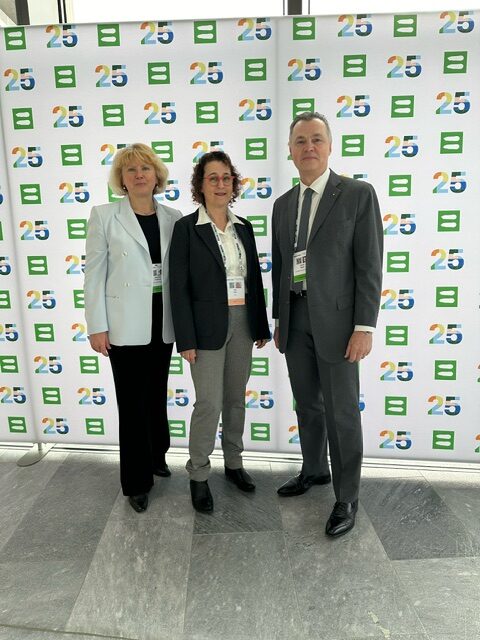
Last February, the National Accreditation Body of Colombia (Organismo Nacional de Acreditación de Colombia – ONAC) embarked on a groundbreaking initiative to elevate the standards of sustainability in the tourism sector through the implementation of Colombian Technical Standards (Normas Técnicas Colombianas – NTC) in Tourism Sustainability Management Systems. This move not only signifies a strategic pivot from Sectoral Technical Standards (Normas Técnicas Sectoriales – NTS) but also underscores Colombia’s commitment to harmonizing with global benchmarks, thereby enhancing the quality and sustainability of its tourism industry.
The new sustainable tourism accreditation service was presented to the Colombian Association of Travel and Tourism Agencies (ANATO), some tourism service providers, and other stakeholders. The event served as a meeting between different stakeholders in the tourism sector, among them the Conformity Assessment Bodies (CABs), one of the key stakeholders and the ones directly interested in acquiring sustainable tourism accreditation services.
Additionally, the event served to raise awareness of the importance of accreditation, particularly in the tourism sector. Accreditation has the potential to contribute to the internationalization of tourism services provided within the country and to make Colombian tourism service providers known to a global audience.


Tourism, a rapidly growing industry, holds the promise of economic prosperity, employment generation, and the promotion of cultural and environmental awareness. However, its unchecked expansion can lead to adverse impacts, including cultural dilution, environmental degradation, and the depletion of local resources. Recognizing these dual facets of tourism, the World Tourism Organization has defined sustainable tourism as a model that fully considers its current and future economic, social, and environmental impacts, addressing the needs of visitors, the industry, the environment, and host communities.
This model aligns seamlessly with the Sustainable Development Goals (SDGs), particularly targeting the promotion of sustainable tourism that fosters job creation and local culture and products. In this light, the Colombian Ministry of Commerce, Industry, and Tourism (MinCIT), in collaboration with the Colombian Institute for Technical Standards (ICONTEC), has spearheaded the transition to NTC in tourism sustainability management, heralding a new era of standardized, high-quality, and sustainable tourism practices.
The transition from NTS to NTC reflects a profound evolution towards a more integrated and formalized framework of standardization within Colombia, setting a new benchmark for quality and sustainability in tourism at a national level. This evolution is a testament to Colombia’s deep-seated commitment to excellence and responsibility in its tourism sector. By aligning with NTC, service providers are not only adhering to national standards but are also positioning themselves competitively in the global market, enhancing their appeal to a more sustainability-conscious clientele.
The significance of this shift cannot be overstated, as it paves the way for a more resilient and competitive tourism industry that is in harmony with environmental conservation, cultural respect, and social responsibility. Moreover, the certification under NTC for sustainability in tourism acts as a catalyst for innovation, fostering economic resilience, attracting investment, and raising awareness about sustainable practices among both providers and tourists alike.
Despite the promising outlook, the heterogeneity of Tourism Service Providers (PSTs) and the financial burden of certification pose considerable challenges. The ONAC’s market study reveals a pressing need for collaborative efforts between government entities and accreditation body to facilitate certification for PSTs, overcoming financial and technical barriers. It suggests tailored incentives, tiered fee structures, and comprehensive support programs to democratize access to certification, ensuring that all segments of the tourism industry can embark on the journey towards sustainability.
This study was prepared by the Coordination of Socioeconomic Studies for Quality Infrastructure, a new area of ONAC in charge of conducting economic research and generating valuable information to support decision-making by ONAC, the CABs, the other actors of the quality infrastructure, as well as other stakeholders. The study can be consulted both in Spanish and English in the following website: https://onac.org.co/en/market-study-of-accreditation-services-in-colombian-technical-standards-for-tourism-sustainability-management-systems/onacs-blog/
There have been several studies conducted by the area, including market analysis studies for the opening of new accreditation services, review of sources that allow understanding the current state and opportunities for improvement of the quality infrastructure in Colombia, reviews of the impact of accreditation on aspects such as energy efficiency or international trade, among other documents. All these studies will be available for public consultation through ONAC’s website.
ONAC’s initiative to offer accreditation services in NTC for Tourism Sustainability Management Systems represents a significant leap towards aligning Colombia’s tourism sector with global sustainability standards. This endeavor not only enhances the competitiveness and attractiveness of Colombia as a sustainable tourism destination but also reaffirms the country’s commitment to responsible tourism practices that safeguard its cultural and natural heritage for future generations. The journey ahead is challenging, yet with strategic partnerships and sustained efforts, Colombia is poised to become a beacon of sustainable tourism on the global stage.

Italy, like most countries, is facing increasingly grave environmental and climate crises, which can affect the availability of potable water. There are also issues with partly obsolete water infrastructure, which lead to leaks and dispersion. The availability and sustainable management of water and of health and hygiene structures, have become one of the 17 objectives of the UN 2030 Agenda for sustainable development, and the European legislator intervened on the topic with the EU Directive 2020/2184. The EU Directive was implemented in Italy in March 2023, through Legislative Decree 18/2023 (the Decree).
The Decree was developed thanks to an extensive partnership between institutions, public and private stakeholders and Accredia, the Italian Accreditation Body. Federico Pecoraro, Deputy Director of Accredia’s Testing Laboratories Department, underlined the important role of tests carried out under accreditation: “In this area, accreditation continues to be a valid tool used by the authorities to establish the level of competence, impartiality and good organizational functioning of those who must ensure a high level of protection of public interests.”
Italian law and EU regulation
Water intended for human consumption can be processed or non-processed water used for drinking, preparing food and drinks or other uses, supplied through a distribution network or in tanks, bottles or containers. This also includes water used for food production and other substances for human consumption, but natural mineral waters are excluded. With the aim of ensuring healthy and clean water, Legislative Decree 18/2023 introduced important innovations for operators of potable water systems, for people involved in water treatment, and for citizens. Accreditation was already mandatory in line with the previous Decree of the Ministry of Health of 14 June 2017, but with the Legislative Decree of 2023 it has become central.
In this way, the role of accreditation for testing laboratories according to the standard ISO/IEC 17025 “General requirements for the competence of testing and calibration laboratories” was strengthened in the areas involving accredited tests on water and the certification of materials in contact with water, as well as management systems of potable water companies and the inspection of distribution networks. Article 6 of the Decree – “General obligations for a risk-based approach to water safety” explains how this approach is aimed at covering “the entire potable water supply chain, including compliance with the specifications in article 5″, and to guarantee “the continuous exchange of information between the operators of potable water distribution systems and the competent authorities in health and environmental matters.”
Accreditation of tests conducted on water
Accreditation of tests on tap water guarantees its healthiness and increases the competences of those who have a key role in the protection, control and monitoring of water resources and their natural environments. Accredited tests guarantee the safety and effectiveness of periodic monitoring of water quality by water service operators, i.e. anyone who supplies water intended for human consumption to third parties.
Out of a total of 1,353 testing laboratories accredited by Accredia (as of 31 December 2023), approximately 60% also conduct tests on water for human consumption. The Decree defined a new list of parameter values to evaluate the quality of water, determined by means of tests carried out by laboratories accredited by Accredia according to ISO/IEC 17025.
Accreditation to certify chemical reagents
The Decree also introduced important innovations regarding the so-called ReMaf, i.e. the chemical reagents and active and passive filtering materials to be used in the processing of water for human consumption. By 12 January 2036 the ReMaf will have to be certified under accreditation and subsequently authorized by the National Center for Water Safety (CeNSiA) and registered in the AnTeA system, in order to be placed on the market.
From a technical point of view, ReMaF are certified by accredited bodies that perform periodic inspections of the production plants, taking samples to be analysed and, for the analyses necessary for certification, they rely on accredited testing laboratories.

Following approval by the ISO Technical Management Board of the above referenced IWA proposal from the British Standards Institution (BSI), the Brazilian Association of Technical Standards (ABNT) and Standards Council of Canada (SCC), ISO is pleased to invite you to develop an International Workshop Agreement (IWA 48) Framework for Implementing Environmental, Social, and Governance (ESG) Principles.
Briefing meetings will be held online in May, to outline purpose of IWA, introduce the initial draft and confirm IWA process. All registered participants will be advised of the dates in due course.
A series of international workshops will take place between July and September 2024. The initial Workshop meeting dates are:
Workshop 1 (virtual)
• 8th July 2024, 11:00 – 14:30 UTC
Workshop 2 (virtual)
• 10th July 2024, 18:00 – 21:30 UTC
These first two workshops will focus on the draft IWA 48 and stakeholder comments received.Stakeholders are requested to attend both workshops as these are not intended to be duplicate sessions.
There will be further workshops in August and September on dates to be announced. Different time zones will be accommodated for these further workshops.
Meeting credentials will be distributed to registered individuals near the date of the meetings. Please visit the ESG IWA registration page (which is being hosted by BSI) to register your interest and participate in the workshops and receive updates, including relevant research and documentation.
An initial draft of the IWA will be shared for feedback to registered stakeholders by 1 May 2024 and details on how to submit comments will accompany the draft.
Further information is available in the Summary Note and Proposal for an International Workshop Agreement. Click 2024-04-05 Circular letter TMB IWA 48 Framework for implementing ESG principles with Annexes for details.

On 18 April, Ms Ileana Martinez, Trade and Accreditation Director of the TIC Council presented at the INetQI meeting. You can find a copy of her presentation Here TIC Council presentation – INetQI meeting
“In closing Ileana mentioned the open session of the TIC Council Summit in May and requested the INetQI members to share the information on the Summit with their membership.
Artificial Intelligence is transforming our lives. From optimising decision-making processes to enhancing productivity, the potential benefits are vast and undeniable.
To fully grasp the implications of AI, we must consider not only its potential benefits but also the ethical and societal dilemmas it presents. Imagine a world where our every move is monitored, our decisions influenced, and our freedoms curtailed by algorithms. This dystopian scenario is not science fiction but a stark possibility if we fail to act responsibly and build appropriate guardrails.
The TIC Summit 2024 will bring together global voices currently working on AI from academia, industry, and regulatory points of view to discuss what it takes to build trust in AI.
Please note that the deadline to register is 1 May.
For further enquiries, please contact the TIC Council Secretariat
To access the full program and register for the Summit, click Here

2024 Annual Meeting of the International Seed Testing Association Set to Commemorate Centennial Milestone in Cambridge, UK
Wallisellen, Switzerland – April 05, 2024 – The International Seed Testing Association (ISTA) is thrilled to announce that the highly anticipated 2024 Annual Meeting will be held in the historic city of Cambridge, UK, from July 1st to July 4th, at the Cambridge Union Society in Cambridge, United Kingdom of Great Britain and Northern Ireland. This year’s gathering holds special significance as it coincides with the remarkable centennial anniversary of ISTA, marking a century of progress in seed quality assurance.
ISTA, a globally renowned association dedicated to promoting uniformity in seed testing procedures and standards, has been at the forefront of fostering innovation and ensuring the quality and reliability of seeds worldwide since its inception in 1924. As it celebrates its hundredth year of advancing the science and practice of seed testing, the 2024 Annual Meeting promises to be an event of unparalleled significance and impact.

Set against the backdrop of the illustrious University of Cambridge, this year’s meeting will bring together leading experts, researchers, industry professionals, and stakeholders from around the world. Attendees can expect a comprehensive program featuring insightful presentations, engaging meetings, and interactive discussions on the latest advancements, trends, and challenges in seed testing, quality assurance, and seed technology.
In addition to the academic and professional sessions, attendees will have the opportunity to explore the picturesque city of Cambridge, renowned for its historic architecture, cultural heritage, and world-class research institutions. The meeting venue, nestled amidst the stunning landscapes and iconic landmarks of Cambridge, will provide an inspiring setting for networking and fostering collaborations among participants.
Registration for the 2024 Annual Meeting of ISTA is open, with early bird discounts available for a limited time, until 30 April 2024.
For more information about the program, registration, venues and accommodations, please visit the official conference website at ISTA2024.
Join us in Cambridge from July 1st to June 4th, 2024, as we commemorate a hundred years of excellence in seed testing and embark on a new era of innovation and collaboration in ensuring global food security and sustainability.
To register click Here

The BIML is pleased to inform you that a series of webinars has been planned, organised by the OIML Digitalisation Task Group (OIML DTG).
The first webinar in the series will be held on Tuesday, 23 April 2024 from 12:00 to 14:00 CEST (“Paris time”) on “The fundamentals of digitalisation in the quality infrastructure”.
It will be based on the January 2024 OIML Bulletin article which reported on the Chiang Mai Seminar, and the main speaker will be Dr Sascha Eichstädt, Chair of the OIML DTG.
The webinar will last approximately two hours and will include presentations followed by an open discussion session.
Please distribute this information within your organisations. To pre-register for the webinar, please click Here

On 4 April Etty Feller, ILAC Chair presented at the UN Economic Commission for Europe (UNECE) Working Party 6, Forum 3 on Digitalization of Quality Infrastructure Processes, looking at current trends in the use of technologies in accreditation, and challenges that these may cause.
Background
The United Nations Economic Commission for Europe (UNECE) was set up in 1947. It is one of five regional commissions of the United Nations, and its major aim is to promote pan-European economic integration. UNECE includes 56 member States in Europe, North America and Asia. Over 70 international professional organizations and other non-governmental organizations also take part in UNECE activities.
The Working Party on Regulatory Cooperation and Standardization Policies (WP6) encourages increased regulatory coherence in specific sectors that have a critical impact on sustainable development and promotes greater resilience to natural and man-made hazards. WP6 also works to:
The project has already delivered a paper detailing how standardization and harmonization of regulations are necessary for the transition to a digital, green economy. More information about the WP.6 AI project is available here: https://unece.org/trade/wp6/digital-regulation-goods-artificial-intelligence
The Forum
WP6 hosted its Third Forum from 2 to 5 April 2024 focused on Green Digital Transformation including AI. Digital technologies are opening up new possibilities for economic development, policy implementation and the management of public services. They also offer the potential for an improved management of natural resources and facilitate the shift towards a circular economy by filling information gaps, increasing efficiency and making new forms of economic activity possible, including changes in production and consumption patterns.
The Advisory Group on Market Surveillance (MARS) was established in 2003 to promote global trade and economic cooperation. It actively brings together member States to discuss best practice for countering sub-standard and counterfeit goods. It has developed comprehensive guidance and serves as a forum of best practice and development of recommendation guidelines. Market surveillance is a set of activities by designated authorities to ensure that products comply with mandatory requirements and do not endanger any aspect of public interest. This involves proper calibration of machinery and measurements (metrology) as well as actively engaging with other border control agencies such as customs.
The conference looked at current trends in the use of technologies in quality infrastructure and challenges that this may cause. Market surveillance authorities, conformity assessment bodies, testing laboratories and standards development organizations were invited to attend the conference.
Speakers
Reducing carbon footprint
Digitalization of quality infrastructure processes
Further information on the work of the UNECE and WP6 is available here

 TODAY IS WORLD WATER DAY!
TODAY IS WORLD WATER DAY!
Learn how ILAC member EMA ac, and accredited inspection bodies, are helping the Mexican State to administer, manage and preserve the quality and quantity of water within their economy.
“At present, the extraction of national waters in the country faces a principal-agent problem caused by information asymmetries relating to the actual amount of water extracted by users. This situation leads to inefficiency in the use of water and, at times, to the under-declaration of volumes to the Mexican authorities.
The national water program in Mexico, since its publication in 2019, has designated the NMX-AA-179 standard as mandatory. In this regulation, it is established that both the ISPs and the Inspection Units are responsible for the selection, installation and operation of the meters or measurement systems, as well as the remote transmission of the measurement information to the authority. In addition, they play a crucial role in ensuring the correct measurement of national waters through the conformity assessment procedure.
Due to these circumstances, it is imperative to make an accurate measurement of the volumes of national waters extracted. This action contributes significantly to counteracting existing information asymmetries, thus strengthening transparency and efficiency in the management of this vital resource.”
You can view the full case study here

ILAC and the World Anti-Doping Agency (WADA) have a long-standing relationship spanning over 20 years.
ILAC and WADA first signed an MoU in 2007, with the latest copy re-signed on 25 November 2021.
WADA-ILAC Memorandum of Understanding (MoU) 2021
Accreditation of anti-doping laboratories by an ILAC MRA signatory is a pre-requisite for WADA accreditation. ILAC and WADA work together to formally recognise the technical competence of the anti-doping laboratories, and this then leads to community confidence in laboratory outputs which are measurement results that are fit for their intended use.
ILAC provides the professional knowledge in assessments, to ensure the professional competence of the testing laboratories for WADA. WADA is responsible for harmonisation between laboratories, training assessors and, as necessary, updating the requirements and binding documents.
Key areas of the ILAC – WADA partnership are:
Our complementary roles are essential in the fight against drugs in sport.
ILAC Chair, Etty Feller attended WADA’s Annual Symposium & 25th Anniversary Celebrations in Lausanne, Switzerland on 12-13 March. She presented during the “Partnerships with International Organizations” session, and the subsequent Q&A, along with representatives from the United Nations Office on Drugs and Crime (UNODC), the World Health Organization (WHO) and the International Federation of Pharmaceutical Manufacturers & Associations (IFPMA).
“We strive to continue to lead together in accordance with ILAC’s Mission”, Ms Feller said.

Pictured above are Victoria Ivanova Senior Manager, International Partnerships Science and Medicine Department WADA , Etty Feller, ILAC Chair and Prof Olivier Rabin, Senior Director Science and Medicine WADA.